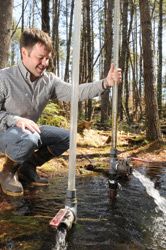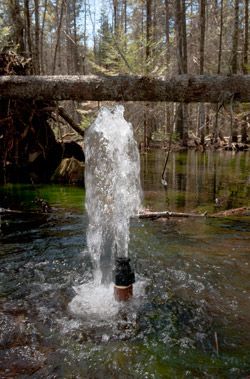Tapping in | After 160 years in Maine, Poland Spring stirs up debate about the state's future
In 1845, when the Ricker family opened Maine’s renowned Poland Spring resort, the aquifer’s supposed healing properties drew sufferers of assorted maladies to “take the waters.” Hiram Ricker, the original landowner’s son, was convinced the spring water cured his chronic indigestion. Today, more than 160 years later, Poland Spring’s association with taking the waters has a whole new meaning. As the bottled water producer, now under foreign ownership, expands its reach to nine locations in Maine, a whole host of concerns are bubbling up about large-scale commercial water extraction. The controversies — ranging from increased truck traffic to Europeans profiting from a local resource — often begin as discussions about local zoning rules but shift into heated discourse about Maine’s identity on several fronts.
Poland Spring’s typical strategy for addressing public concerns — which officials say is rooted in accessibility and transparency — hit a wall in Fryeburg, the company’s most recent ground zero. In this Oxford County town near the New Hampshire border, a vocal minority’s opposition to a proposed pumping station gained traction before the facts could, according to Mark Dubois, natural resource manager for Poland Spring. “We want to be as clear as the water with any new community,” he says from his Fryeburg office. “I think it’s the way to operate in Maine.”
Fryeburg already is home to one of the company’s six satellite springs. Now, following a March ruling by the Maine Supreme Judicial Court, Poland Spring will begin piping water from aquifers in the nearby town of Denmark to an East Fryeburg pumping station on Route 302, where trucks will pick up and transport the water to a bottling plant in Hollis. The local planning board approved the plan in 2005, but a group of citizens successfully appealed the decision, arguing that the board failed to honor a comprehensive plan requirement to consider the impact on residents. The case wound up in court, and the March ruling stated that the town’s comprehensive plan was designed for guidance and could not be used to revoke the original permit. The company hopes to have the station, which could fill up to 50 trucks a day, up and running by late winter.
Public perception
Poland Spring’s direct approach worked in Kingfield, 80 miles north, after some initial skepticism. The company in November opened a $60 million bottling plant there that employs about 40 people, which it had originally hoped to locate in Fryeburg. Alison Hagerstrom, executive director of the Greater Franklin Development Corp. in Farmington, had read about the proposal in the paper and called up Poland Spring to pitch her area. Northern Franklin County had lost more than 1,500 jobs over the previous decade, and Poland Spring offered well-paying jobs based on a renewable resource, she said. “Some people don’t like big corporations,” Hagerstrom says. “But the big corporation in this case had the financial resources to put the plant in Kingfield.”
The company’s roots make a compelling case for many, but others find its claim to Maine disingenuous. Nestle Waters North America’s Swiss parent company bought Poland Spring in 1980. “Poland Spring is not even a corporation in the state of Maine,” says Jim Wilfong, a longtime water activist who lives in nearby Stow. “It’s not the same little old Maine company.” Beginning in 2000, Poland Spring’s presence was limited to a handful of trucks a day in Fryeburg. But the expansion sparked questions about the rural quality of life in town and the future scope of the company’s growth, said Wilfong, who played a central role in the 2007 enactment of a state law that upped oversight of commercial water extraction. He says the company bullied people and sued to get their way, which has added to the opposition.
The pumping station will be located in an area already prone to dangerous accidents, and doesn’t belong in a residential area, says Scott Gamwell, a member of Western Maine Residents for Rural Living, the group that opposed the project.
Don Thibodeau, owner of Green Thumb potato farm in Fryeburg and founder of Cold River Vodka, says he hopes the town can work with Poland Spring now that “cooler heads” have prevailed. He draws water from an aquifer in the same watershed to wash potatoes and produce vodka, among other uses. “Shame on us as a citizenry for the fact that we can’t get a good agreement for the town and a good working relationship with a company that has the ability to pay taxes and offer jobs to the town of Fryeburg,” he says.
Who owns the water?
Poland Spring just happened to be the business involved when people started paying more attention to the ownership and protection of water as an essential natural resource, according to Wilfong. “It provokes a big discussion about how the water thing’s working,” he says. Another look back at the 1800s uncovers the origin of “absolute dominion,” a law still on the books in Maine that allows landowners to extract water on their property, even if it means diverting water from a neighbor. But a movement has formed to regulate groundwater the same way as surface water, as a resource under the public trust. That proposal, a bill to tax extracted groundwater used for bottling and another to amend the definition of large-scale wells, is now being considered by the Natural Resources Committee. In all, the committee is considering six bills this session covering large-scale groundwater extraction in Maine.
Concerns about environmental effects and truck traffic related to Poland Spring are often legitimate, but groundwater in Maine is no more a publicly owned resource in Maine than oil is in Texas, says Jeff Pidot, the former head of the attorney general’s natural resources division. “I don’t know where that legal theory comes from,” he says. But, there’s no reason why the state can’t impose a severance tax on groundwater, says Pidot, who was involved in past Poland Spring efforts but has since retired. Ownership issues raise a key question, he says: What does the public get out of all this? “If there is ever a severance tax in Maine, Poland Spring might actually benefit,” he said. “Once the public gets a share of the revenue, then there is an economic benefit.” Many water activists argue that Maine’s groundwater could become even more precious in the future as the country’s water consumption continues to increase. Establishing public ownership now would give Mainers a stake in that valuable resource, instead of a corporation, they say.
According to the U.S. Geological Survey, bottled and bulk water represented 0.4% of Maine’s 170.7 billion gallon water use in 2007. Poland Spring used about 700 million gallons that year, Dubois says. The largest users were the industrial, thermoelectric and public supply categories.
Water discussions often provoke an emotional response, sometimes more than other natural resources. Bryan Pullen of Summit Spring Water, a small bottler in Harrison, says his company has been lumped in with larger operations in the public debate. Strong feelings have often clouded the fact that his business bottles only natural spring overflow, and does not extract water like Poland Spring, he says. A day after speaking at a forum on water issues at Bates College, Pullen referenced a comment he said someone from the Maine Drinking Water Program recently made to him. “If Poland Spring could only find a way to wrap their tankers in fake logs, no one would say a thing,” Pullen recounts. “Does anybody complain when trees leave the state of Maine?” he adds. “Does anybody complain when lobster leaves the state of Maine?”
Public concern about commercial water extraction in recent months has led to bans on the practice in Newfield and Shapleigh. Last summer, the Kennebunk, Kennebunkport and Wells Water District backed away from a proposed 30-year contact with Poland Spring following local opposition. A group of residents in Wells proposed banning companies like Poland Spring from extracting water there, but the select board voted earlier this month against putting the measure before voters at the June town meeting. The town’s ordinance review committee also has its own proposal to regulate water extraction.
Maine’s business climate
Tom Brennan widens his eyes in amazement and clasps his hands to his head, dumbfounded, as he talks about the lack of awareness about Nestle Waters’ investment in Poland Spring. “It was tiny before it was acquired by outside interests,” says Brennan, a senior natural resource manager with Nestle Waters. “Half a billion dollars later, there are 800 employees.” According to Poland Spring, it has invested more than $439 million in capital in the state since 1992, has a payroll of $40 million, spends $65 million with Maine vendors and has invested $2.5 million since 2000 in community giving.
Poland Spring ranks third by sales behind PepsiCo’s Aquafina and Coke’s Dasani bottled water brands, according to industry tracker Beverage Marketing Corp. Bottled water sales by volume dropped 1% in 2008, but outperformed the “refreshment beverage” category as a whole, which fell 3%. Poland Spring’s 2007 annual wholesale sales totaled $878 million, according to Beverage Marketing Corp. About 15% of all Poland Spring water is sold in Maine, Dubois said.
The prospect of jobs and tax income from the Fryeburg project was adequately considered, Wilfong says, but was one of many factors, including the prospect of diminishing water availability in the future. “Are we only driven by money?” he asks. Gamwell said the risk the project posed to safety and real estate values far outweighed possible benefits, and he questions whether the corporate income tax Nestle pays as a foreign corporation is significant. (Maine does not release individual corporate income tax information.) Maine workers are contributing to Nestle’s bottom line. The company’s plants here operate at higher efficiencies than anywhere else, running at near 90%, according to Dubois.
Much of the opposition toward Poland Spring and other manufacturers in Maine can be attributed to “tribalism and selfishness,” according to Lloyd Irland, a forestry consultant who once served as director of the Bureau of Parks and Lands and as state economist. Few forest products endeavors, with their tree cutting and smoke-emitting plants, are as “tidy” as bottled water, he says. “If we can’t get people to accept a bottled water plant, they’re not going to buy into a biomass plant, a sawmill,” Irland says. Nervousness about the nibbling away of Maine’s rural character causes people to target companies like Poland Spring because they can’t stop construction of the subdivision up the road, which also contributes to traffic, he says. And many of the people Poland Spring would employ live outside the towns casting votes on its expansion efforts, Irland says. “It used to be something every community wanted,” he says of business investment. “It just isn’t anymore.”
Bryan Pullen of Summit Spring wonders why, in a state blessed with abundant and renewable water, a company can’t use it to make a profit. “Poland Spring takes a lot of heat that is probably not deserved,” he says. “We’ve killed just about every kind of production in this state that we can.”
The Lakes Region is an ideal location for another Poland Spring plant someday, though building projections have slowed due to the economy and weakening bottled water sales nationwide last year, Dubois says. But the company looks forward to performing well in the future. “We’re hopeful that this brand is good and is something the consumer wants and needs,” he says. Wilfong also looks to the future, 50 years ahead, when the debate about who should “take the waters” is sure to remain fervent. “It’s water. That’s a big issue,” he says. “We can’t live without water.”
Jackie Farwell, Mainebiz staff reporter, can be reached at jfarwell@mainebiz.biz.















Comments